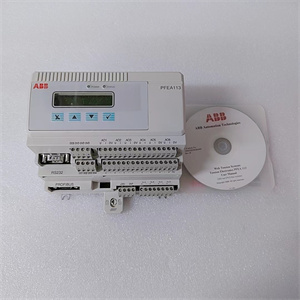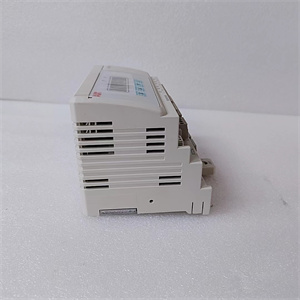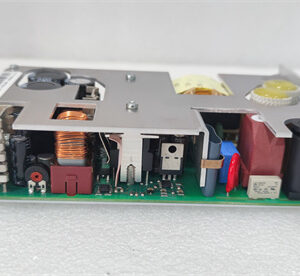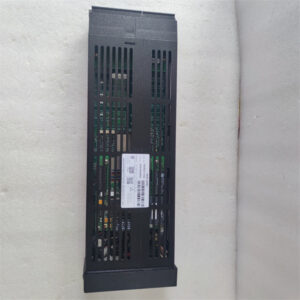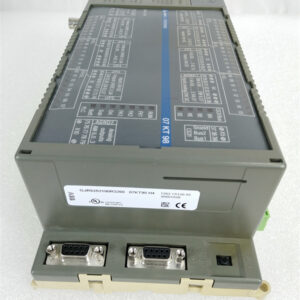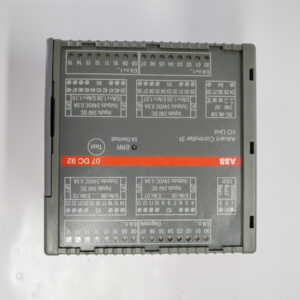Description
Detailed parameter table
| Parameter name | Parameter value |
| Product model | PFEA113 – 20 |
| Manufacturer | ABB |
| Product category | Tension meter processing unit |
| Input signal type | Compatible with signals from load cells (pressure sensors) |
| Communication interface | Profibus for connection to automation systems |
| Rated supply voltage | Usually within common industrial DC voltage ranges, e.g., 24 V DC (check specific manual) |
| Measurement accuracy | High – precision measurement, crucial for accurate tension control in industrial processes |
| Dimensions (approx.) | Specific dimensions not found, but designed to be compact for industrial installations |
| Weight | Lightweight for easy installation and integration, details in product manual |
| Operating temperature range | Suitable for typical industrial environments, e.g., -10°C to +50°C (estimated, verify with manual) |
| Protection level | Designed to withstand industrial conditions, protection level details in product documentation |
| Calibration method | Built – in calibration functions for accurate tension measurement |
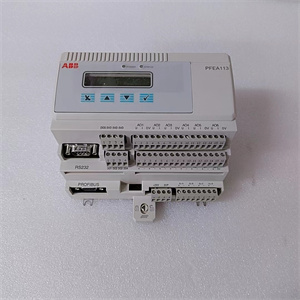
ABB PFEA113-20
Product introduction
The ABB PFEA113 – 20 is a vital processing unit within ABB’s suite of industrial measurement solutions, specifically designed for tension measurement systems. As an integral part of ABB’s industrial automation product line, it plays a crucial role in ensuring precise control of tension in various industrial processes.
This unit is designed to work in tandem with load cells, which are typically installed between the bearing seats of guide rollers and the mechanical framework in industrial setups. When a material, such as a strip of steel in a rolling mill, passes through the guide roller with a certain wrap angle, the load cells generate pressure signals. The ABB PFEA113 – 20 processes these signals and accurately converts them into the tension value of the material. It then transmits this data via its Profibus interface to the overall automation system, enabling seamless integration into the production line’s control loop. Whether in a continuous acid – rolling production line or other manufacturing processes where tension control is critical, the ABB PFEA113 – 20 provides the necessary accuracy and reliability to maintain product quality and process efficiency.
Core advantages and technical highlights
High – precision measurement
The ABB PFEA113 – 20 is engineered to offer extremely high – precision measurement capabilities. In industrial applications like steel rolling, even minor variations in tension can lead to significant quality issues in the final product. By accurately processing the signals from load cells, it ensures that the measured tension values are highly reliable. This precision directly contributes to maintaining tight control over the production process, reducing product defects, and enhancing overall product quality.
Easy integration
With its Profibus interface, the ABB PFEA113 – 20 is designed for seamless integration into existing industrial automation systems. Profibus is a widely used industrial communication protocol, which means that the unit can easily communicate with other components such as programmable logic controllers (PLCs) and supervisory control and data acquisition (SCADA) systems. This compatibility simplifies the process of incorporating the tension measurement system into complex industrial networks, saving time and resources during system setup and expansion.
User – friendly calibration
Calibration is a crucial aspect of ensuring accurate measurement. The ABB PFEA113 – 20 features user – friendly calibration functions. Operators can easily set parameters such as the nominal load, zero the tension meter before the production process starts, and adjust the wrap angle gain according to the actual production conditions. This ease of calibration not only improves the accuracy of measurement but also reduces the time and effort required for maintenance and operation, making it suitable for both experienced technicians and those new to industrial measurement systems.
Typical application scenarios
In the steel manufacturing industry, the ABB PFEA113 – 20 is widely used in continuous rolling mills. During the rolling process, maintaining the correct tension of the steel strip is essential. If the tension is too high or too low, it can cause thickness variations in the rolled steel, leading to substandard products. The ABB PFEA113 – 20 accurately measures the tension of the steel strip as it passes through the guide rollers. The data is then sent to the central control system, which adjusts the rolling parameters in real – time to ensure a consistent and high – quality product.
In the paper manufacturing industry, the tension of the paper during the production process affects its quality and appearance. The ABB PFEA113 – 20 can be used to measure the tension of the paper as it moves through different stages of the production line, from the initial forming to the final winding. By providing accurate tension data, it helps the control system adjust the speed and tension of the paper – making machinery, preventing wrinkling, tearing, or uneven thickness in the paper products.
In the textile industry, especially in processes like weaving and spinning, maintaining proper tension of the yarn is crucial. The ABB PFEA113 – 20 can be integrated into textile machinery to measure the tension of the yarn. This allows for real – time adjustment of the machinery settings, ensuring that the yarn is processed under optimal tension conditions. As a result, the quality of the textile products is improved, with fewer defects such as broken threads or uneven fabric textures.
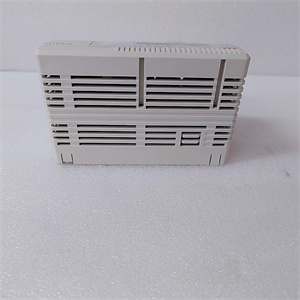
ABB PFEA113-20
Related model recommendations
- ABB PFEA112: Similar to the ABB PFEA113 – 20, it is also a tension meter processing unit. However, it may have some differences in terms of features or performance. For example, it might have a slightly different set of calibration options or a different communication interface in some versions. It can be used as an alternative depending on the specific requirements of the industrial process, such as in less complex systems where its features are sufficient to meet the tension measurement needs.
- ABB PFEA111 – 20: This is another controller module in ABB’s product range. It may be part of the same family as the ABB PFEA113 – 20but could be designed for different levels of functionality. It might have a lower processing power or fewer input/output options, making it suitable for applications where the tension measurement requirements are less demanding or where cost – effectiveness is a primary concern.
- ABB ACS880 Drive Controller: Although not a tension meter processing unit directly, it can work in coordination with the ABB PFEA113 – 20in industrial systems. For example, in a rolling mill, the ACS880 can control the speed of the motors driving the rollers, while the ABB PFEA113 – 20 measures the tension. By integrating these two components, the overall process can be better optimized to maintain the correct tension while adjusting the speed of the material movement.
- ABB PLC (e.g., AC500 series): Programmable logic controllers like the ABB AC500 series can be used in combination with the ABB PFEA113 – 20. The PLC can receive the tension data from the ABB PFEA113 – 20via the Profibus network and use this information to control other aspects of the industrial process. For instance, it can adjust the operation of other machinery based on the measured tension values, creating a more integrated and automated production system.
- ABB IRB 1200 Robot Controller: In some automated manufacturing processes where robots are involved in handling materials, the ABB IRB 1200 Robot Controllercan interact with the ABB PFEA113 – 20. For example, in a factory where a robot is moving a tension – sensitive material, the robot controller can use the tension data from the ABB PFEA113 – 20 to adjust the robot’s movement speed and force, ensuring that the material is handled without causing excessive tension or damage.
Installation, commissioning and maintenance instructions
Installation preparation
Before installing the ABB PFEA113 – 20, ensure that the installation environment is free from excessive dust, moisture, and electromagnetic interference. The unit should be mounted in a location that provides easy access for maintenance and calibration. Use appropriate mounting brackets or fixtures as recommended in the product manual. When connecting the unit to load cells, make sure to use shielded cables to minimize signal interference. Verify that the power supply voltage matches the requirements of the ABB PFEA113 – 20 and that all electrical connections are made in accordance with safety standards. Disconnect the power supply before making any wiring connections to prevent electrical accidents.
Maintenance suggestions
Regularly check the connections between the ABB PFEA113 – 20 and the load cells as well as other components in the system. Loose connections can lead to inaccurate measurements. Periodically clean the unit to remove any dust or debris that may have accumulated, as this can affect its performance. Use a soft, dry cloth for cleaning. If there are any issues with measurement accuracy, perform a calibration check using the built – in calibration functions. When replacing components, such as the communication interface module if there are communication problems, always use ABB – approved spare parts to ensure compatibility and maintain the performance and reliability of the unit. Keep a record of all maintenance activities, including calibration dates and any component replacements, for future reference.
Service and guarantee commitment
ABB offers a comprehensive service and guarantee for the ABB PFEA113 – 20. The product comes with a standard warranty period, during which ABB will repair or replace the unit free of charge in case of any defects in materials or workmanship. ABB’s global technical support team is available 24/7 to assist customers with any installation, configuration, or operational issues. Customers can access technical support via phone, email, or an online support portal. In addition, ABB provides regular software updates and firmware upgrades to enhance the performance and functionality of the ABB PFEA113 – 20. For customers who require additional support, ABB offers extended service contracts that include preventive maintenance services, priority technical support, and on – site training. With ABB’s long – standing reputation for quality and reliability, customers can be confident in the performance and support of the ABB PFEA113 – 20 in their industrial applications.
